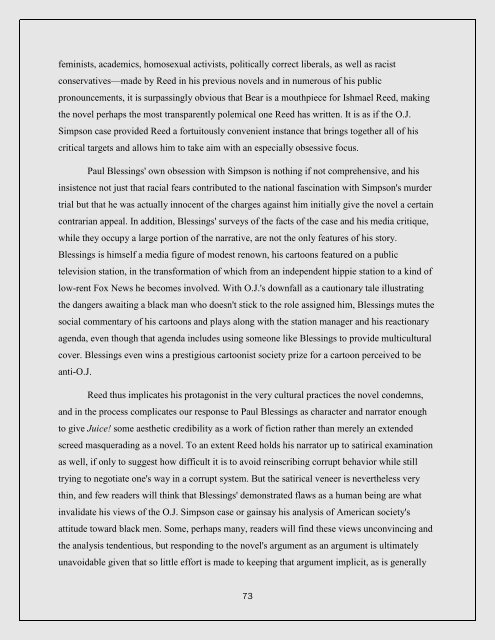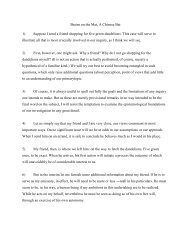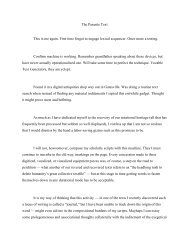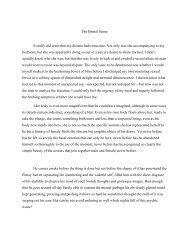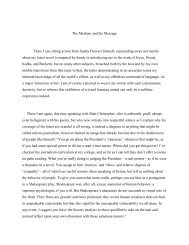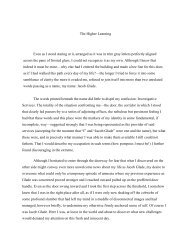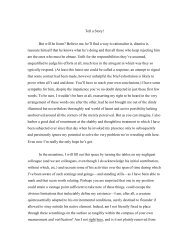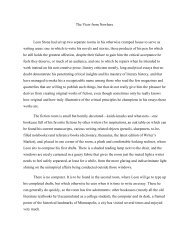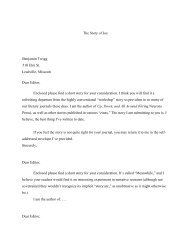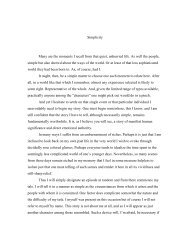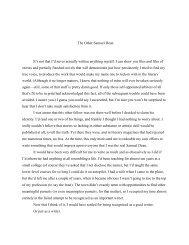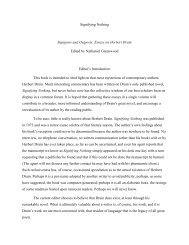APF
Create successful ePaper yourself
Turn your PDF publications into a flip-book with our unique Google optimized e-Paper software.
feminists, academics, homosexual activists, politically correct liberals, as well as racist<br />
conservatives—made by Reed in his previous novels and in numerous of his public<br />
pronouncements, it is surpassingly obvious that Bear is a mouthpiece for Ishmael Reed, making<br />
the novel perhaps the most transparently polemical one Reed has written. It is as if the O.J.<br />
Simpson case provided Reed a fortuitously convenient instance that brings together all of his<br />
critical targets and allows him to take aim with an especially obsessive focus.<br />
Paul Blessings' own obsession with Simpson is nothing if not comprehensive, and his<br />
insistence not just that racial fears contributed to the national fascination with Simpson's murder<br />
trial but that he was actually innocent of the charges against him initially give the novel a certain<br />
contrarian appeal. In addition, Blessings' surveys of the facts of the case and his media critique,<br />
while they occupy a large portion of the narrative, are not the only features of his story.<br />
Blessings is himself a media figure of modest renown, his cartoons featured on a public<br />
television station, in the transformation of which from an independent hippie station to a kind of<br />
low-rent Fox News he becomes involved. With O.J.'s downfall as a cautionary tale illustrating<br />
the dangers awaiting a black man who doesn't stick to the role assigned him, Blessings mutes the<br />
social commentary of his cartoons and plays along with the station manager and his reactionary<br />
agenda, even though that agenda includes using someone like Blessings to provide multicultural<br />
cover. Blessings even wins a prestigious cartoonist society prize for a cartoon perceived to be<br />
anti-O.J.<br />
Reed thus implicates his protagonist in the very cultural practices the novel condemns,<br />
and in the process complicates our response to Paul Blessings as character and narrator enough<br />
to give Juice! some aesthetic credibility as a work of fiction rather than merely an extended<br />
screed masquerading as a novel. To an extent Reed holds his narrator up to satirical examination<br />
as well, if only to suggest how difficult it is to avoid reinscribing corrupt behavior while still<br />
trying to negotiate one's way in a corrupt system. But the satirical veneer is nevertheless very<br />
thin, and few readers will think that Blessings' demonstrated flaws as a human being are what<br />
invalidate his views of the O.J. Simpson case or gainsay his analysis of American society's<br />
attitude toward black men. Some, perhaps many, readers will find these views unconvincing and<br />
the analysis tendentious, but responding to the novel's argument as an argument is ultimately<br />
unavoidable given that so little effort is made to keeping that argument implicit, as is generally<br />
73


